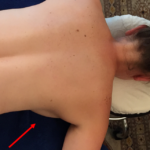What Are Common Behaviors of Predatory Massage Therapists that Lawyers Should Know?
August 1, 2025

Understanding and respecting personal and professional boundaries are crucial aspects of massage therapy. A client should never be made physically or emotionally uncomfortable during a massage, so when a massage therapist fails to acknowledge those boundaries, it can lead to serious consequences. When I testify in a massage sexual abuse case, it is not always clear to lawyers what constitutes predatory behavior. So, what are the common behaviors of predatory massage therapists that lawyers should know?
These behaviors are:
- Excessive self-disclosure or invasive questioning
- Comments about clients’ bodies
- Going beyond a client-therapist relationship
- Poaching clients
First, we will start with some basic background context. Most sexual abuse in massage cases that I have testified in have taken place in a day spa or a massage spa franchise setting, which means multiple massage therapists have been hired to work at these places. Because these businesses are responsible for hiring and supervising the massage staff, it is particularly important for their policies and procedures to be very clear. Every massage client should be informed in writing about what is ok and what is not in a massage session. This information is typically provided in the form of a client educational brochure or a client bill of rights, which can be found either in a physical brochure or on the business’s website.
When a business’s hiring practices, onboarding, or procedures are lacking, the potential for the company to employ a predatory therapist who disregards boundaries is higher. It is important for lawyers to be aware of the signs of therapists who don’t respect boundaries. These boundary violations are indicators of the potential for worse behavior and typically precede sexual abuse and assault. Here are four of the most common behaviors that lawyers should know:
1. The Massage Therapist Engages in Excessive Self-Disclosure or Invasive Questioning
First on this list are massage therapists who talk about themselves, their personal problems, or their opinions during a massage session, as well as asking clients personal questions. Or therapists who talk or ask incessantly about charged topics like religion, money, sex, politics, or the state of the world. These are all signs of poor boundaries. At franchises and larger established massage clinics, therapists are taught not to even broach these topics.
In a sexual abuse case I was testifying in, a therapist actually asked, “How is your sex life?” That question is completely inappropriate and unacceptable in a professional massage setting.
In massage, these behaviors are not only unprofessional but dangerous because of the very nature of the environment, where clients are vulnerable, and the massage therapist has the majority of the power. Skilled managers would terminate these therapists, who violate professional boundaries so egregiously. In fact, massage therapists who engage in such inappropriate behavior should be counseled out of the profession. Their behavior sends a message that they are clearly not focused on the client’s needs, and it suggests that if they have other types of urges and impulses, they may act on them.
2. The Massage Therapist Comments on Their Clients’ Bodies
The second common behavior of a predatory massage therapist is that they comment on the appearance of their clients’ bodies. They might make comments like, “You have a really great body,” or “Wow, you have such an athletic, attractive body,” or “Do you know you have a really awful-looking mole on your back? You should get rid of that.” All of these comments are red flags that should not be ignored.
Compared to more inappropriate sexual behaviors, comments like these might seem relatively innocuous, but these types of boundary violations show that the therapist is either out of touch with themselves or the client. The therapist is showing a profound lack of awareness of interpersonal boundaries, and they have difficulty seeing the difference between what they want and what the client may want, which is extremely dangerous in a vulnerable massage setting.
3. The Massage Therapist Invites Clients into a Different Relationship
The third inappropriate behavior is when a massage therapist asks to see clients outside of the massage treatment context, essentially inviting them into a different relationship. In ethics, these types of relationships are referred to as “dual relationships,” and engaging in them can create ethical dilemmas and potentially compromise clients’ care by blurring professional boundaries. This blurring may then lead to exploitation or harm, so it is always best for professional therapists to avoid them.
These invitations may include asking the client out on a date, exploring a friendship, or investing in a business venture. And they all violate the client-therapist relationship, which should remain focused only on the client and meeting their needs, not on what the therapist wants. Sometimes, the client themself will initiate an invitation to a dual relationship. In these cases, a professional therapist gently declines, but the ones with predatory tendencies accept. Therapists with poor boundaries have trouble separating their desires from their clients and, again, have the potential to be very dangerous.
4. The Massage Therapist Poaches Clients from Their Employer
The last inappropriate behavior is when a therapist poaches clients from their employer. When a therapist works for a clinic or a spa, they usually sign an agreement not to take clients away from that business. It costs time, energy, and money to build up a client base, and businesses want to protect their investment.
So, when a therapist offers to treat a client at a different location, such as the client’s home, a private office, or the therapist’s home, or for a lower price, this behavior crosses a professional line. They may not agree with the policy, but because they signed an agreement, they should respect and honor that agreement. When a therapist crosses this line, they are violating the trust and the boundary established between them and their employer. And if the therapist is willing to violate that boundary, they are likely to violate others as well.
These Boundary Violations are Dangerous and Precede Worse Behaviors
The behaviors I have described above have occurred multiple times in sexual assault cases I have been an expert witness in over the last 20 years. Predatory therapists follow many distinct, identifiable patterns. Just today, I got a call from a lawyer saying, “I watched the videos on your site, and that’s exactly what happened in the case I’m working on.” Spas have a duty to screen, hire, and train therapists accordingly.
And even though these behaviors are inappropriate for ethical massage therapists, there are ways to mitigate them before they turn into even more inappropriate violations. A professionally run organization has excellent and thorough hiring practices and provides ethics training to its new hires during onboarding, addressing the above-mentioned red flag behaviors. These businesses would also have a culture of zero-tolerance where, if a massage therapist is found to have engaged in any of these behaviors by anyone, they would be immediately reported to their manager. And because they pose such a danger to all clients, any reputable spa or clinic would immediately end their employment.
In the case of a minor boundary crossing, like excessive talking that occurred only once, a responsible company would offer additional training and then closely monitor the therapist’s behavior. This monitoring could include sending multiple secret shoppers or reviewing written surveys from all of that therapist’s clients over several months. The surveys would be specifically tailored to ask for boundary-crossing information, and at least three or four questions should ask about the specific behavior that is being monitored, such as excessive talking in this case. But if it happens again, the therapist should be terminated.
If you’re a lawyer who is currently involved in a sexual assault case and needs an expert witness with a massage or spa background, schedule a conversation with Dr. Benjamin.
Ben E. Benjamin holds a Ph.D. in Sports Medicine and has been an expert witness in cases of sexual assault in a massage/spa setting since 2004, advising lawyers, testifying in depositions and trials, and writing reports. His expertise extends beyond massage therapy and ethical behavior. He also advises spas, both large and small, on the creation of comprehensive sexual assault prevention strategies that ensure safe and ethical practices in the industry.
Common Behaviors of Predatory Massage Therapists FAQs:
- What are the most common boundary violations that typically happen before a sexual assault in a massage context?
A massage therapist disclosing too much about their personal lives, asking a client invasive questions, making comments about a client’s body, expanding a client relationship beyond the professional client-therapist one, and poaching clients from their employer.
- What can massage therapists talk to clients about?
Massage therapists can talk about the session and check in with the client about preferences or pressure. Anything beyond this, especially disclosing too much about themselves or asking extremely personal or invasive questions, is unprofessional.
- Why is it dangerous for a massage therapist to engage in excessive self-disclosure or invasive questioning?
Massage therapists who engage in these behaviors have poor boundaries and might act on unprofessional and/or predatory impulses.
- Is it ok for massage therapists to make comments about clients’ bodies?
It is completely inappropriate for massage therapists to comment on the appearance of their clients’ bodies.
- Why is it dangerous for a massage therapist to comment on a client’s body?
It shows that the therapist is out of touch and lacks awareness of interpersonal boundaries. They have difficulty distinguishing between their desires and their clients’.
- Why is it dangerous for a massage therapist to invite a client into a romantic, platonic, or business relationship?
All of these relationships violate the client-therapist relationship and distract from meeting the needs of the client. A massage therapist who pursues relationships outside the client-therapist relationship is showing poor boundaries.
- Why is it dangerous for a massage therapist to poach clients from their employer?
They are violating an agreement and boundary made with their employer, and if they are willing to steal clients, they are likely to violate other agreements or boundaries.
- What do reputable businesses do to address these red-flag behaviors?
If one of their employees is caught egregiously behaving in these ways (excessive self-disclosure, invasive questioning, making comments about bodies, inviting clients into other relationships, poaching clients), spas or clinics should terminate their employment. If the boundary crossing is minor, monitoring may be appropriate, such as through secret shoppers or client surveys; however, if it occurs a second time, termination is warranted.
Related Posts

Expert Witness Insight: Sexual Assault and Poor Draping in Massage Therapy
What is Draping in Massage Therapy? Draping in massage therapy means securely covering the body with a sheet, blanket, and/or towel so that the private areas of the body are covered, feel safe, and are not ever exposed. These areas include the genitals, the female breasts, and the lower buttock, where the gluteal cleft is, […]

How High is Appropriate to Massage on the Upper Inner Thigh?
How High on the Upper Inner Thigh to Massage? The upper inner thigh is one of the gateway areas where predator massage therapists begin their sexual assault. The thigh should be draped so that the pelvis and the inner thigh are securely covered. The drape is generally a sheet tucked under the thigh and […]

Expert Witness Insight: When Massage Therapists Work on the Buttocks
When massage therapists work on the buttocks, clear communication is needed so the client feels safe. This area of the body is not usually touched by anyone other than an intimate partner. Consent is Required for Work on the Buttock in Massage Work in this sensitive area necessitates a conversation with the client before […]

Expert Witness Insight: Touching the Side of the Breast When Lying Face Down
Touching the Side of the Breast When Lying Face Down I would say that more than 99% of massage therapists are ethical professionals who would never commit a sexual assault on anyone. Massage therapists who are sexual predators are usually male and frequently test and groom the clients they choose to assault sexually. For example: […]

Working On the Chest in Order to Move to the Breast
Working On the Chest in Order to Move to the Breast When working on the pectoral muscles, the drape is lowered slightly. The pectoral muscles can be massaged appropriately, working not more than one or two inches below the collarbone. The point is that therapists are trained to work on the pectoral muscles while avoiding […]
